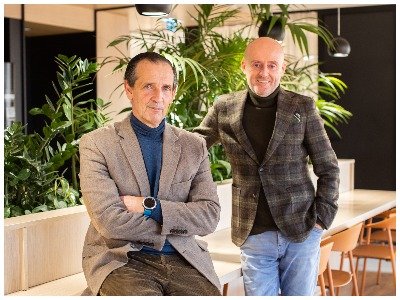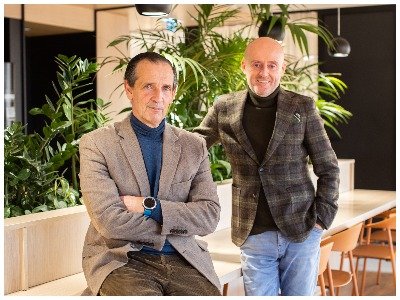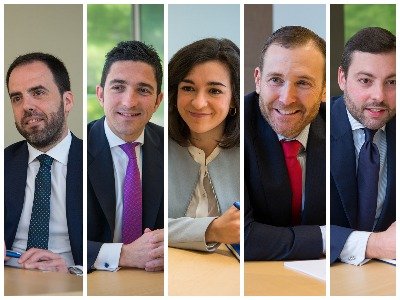Two heads are better than one

There are not many, if any law firms in Portugal, with a bigger Litigation practice than SPS. The firm counts on a team of over 100 lawyers, with more than 50% of its fee earners fully dedicated to the Dispute Resolution area. Iberian Lawyer had the pleasure to interview the two co-founders, Pedro Malta da Silveira and Manuel Gibert Prates. SPS has been growing organically since 1989. It would be fair to say that up until a few years ago, the firm has kept a fairly low profile. In recent times, the market has witnessed an increase in visibility and lateral hires joining the firm. Sources confirm that this has not gone unnoticed. Earlier this year, SPS invested heavily in a new architecture project, renewing its work space and betting on “balance between work and family”. The two co-founders clearly care deeply about their project, recognising the importance of maintaining their culture. They also believe they are strongly positioned for the future, with their client base representing the Banking and Finance, Insurance, Retail, Automotive and Pharmaceutical sectors, many of which have been working with the firm for over 30 years. More importantly perhaps, both co-founders recognise that their legacy matters, and share with us how they would like the firm to look when their time at the helm comes to an end.
 SPS is renowned for having one of, if not the largest, Litigation practices in Portugal. Is this still the main priority for the firm?
SPS is renowned for having one of, if not the largest, Litigation practices in Portugal. Is this still the main priority for the firm?
Litigation Law is a critical area of high concern to clients. It cuts across all areas of practice, and is contained in each of them. At SPS, we practice preventive law, and the best way to prevent conflicts and compliance failures is precisely, in the consultancy phase, to use litigation know-how, anticipating critical points. In our opinion, this anticipation is much more effective when, in all areas of practice, lawyers have experience of Litigation and conflict. Therefore, we empower and train our lawyers to be able to provide holistic advice in their areas of practice. SPS clients, with whom we have maintained relationships of trust for several decades, rely on our experience and expertise in the area of Litigation, which has been a core area since the beginning of SPS, and will continue to be, as long as there are conflicting matters. In all legal practice, which includes, compliance, situations of tension must be prevented. We believe that this is the core starting point of a lawyers’ activity. We can say that the priority at SPS is to avoid conflicts in all legal areas, with the security of those who know what can happen if things don’t go well, as we have a remarkable and transversal experience in this regard.
What initially attracted you both to a career in the legal profession?
We are the founding partners of SPS which has more than 30 years of practice. What, in the last century, attracted us to this path of exercising a legal profession was, in addition to the enthusiasm to defend the interests of people and companies that trusted us, the realisation that the market in Portugal at the time was still operating in a a classic and inflexible model that cannot be matched with the demands of customers and, above all, with the potential that new technologies at that time already showed.
Who were the biggest influences in your early career and what did they teach you?
Our careers started simultaneously with the practice of law at SPS and with a performance as in-house lawers. Hence, our greatest influences were precisely the organisational models that prevailed in companies where we found truly inspiring managers.
What do you think are the biggest challenges law firm leaders are currently facing?
Corporate culture: from a certain dimension, in particular with the assimilation of different cultures, it becomes critical to develop unified work models and ways of being. Of course, this is facilitated by the globalisation of practices, but not to the point of giving up the identity that brought us here. Another great challenge is the retention of talent: the new world that opens up to us with the post-Covid will force law firms to maintain a level of concern with the levels of satisfaction of their professionals that goes well beyond mere professional performance. We would also emphasise, in close connection with the previous point, flexibility: technological innovation is an essential tool to meet the expectations of customers and, above all, to ensure high levels of quality in the work delivered.
How do you think SPS can and does differentiate itself from your main competitors?
SPS differentiates itself from most of its competition in several aspects. From the outset in the circumstance of the growth of SPS having operated in an organic way: practically all partners started their careers as lawyers at SPS. This allows us to present very striking distinctive elements: there is a huge connection between everyone in the way they view the profession. This, of course, is felt in the relationship with the clients through the creation of bonds of enormous consistency: our core clients in the various areas of provision of legal services, and the people who work or have worked there, establishing relationships of enormous durability, with SPS and with the lawyers who work there. On the other hand, we are aware that our typical pattern as a law firm does not necessarily correspond to what the market thinks is typical of these organisations: in addition to having always been profound enthusiasts of the virtues of new technologies we focus our attention on our work environment: we want SPS to be a place where people feel good about working. Customers, again, realise this and not just the technical rigor of our service, because the latter is enhanced with increased levels of personal satisfaction (everyone knows this, it is in the management manuals, particularly in business areas of providing intellectual services). Look at this very concrete example: we launched a new concept of a physical model of an office and a work paradigm, where people feel at home, and where they will be, tending to be definitively, in a hybrid regime.
Which practice areas and sectors do you consider essential to the firm’s future?
The evolution and trends of the market dictate the needs, and therefore, the development of the areas of practice of Law. The future is green, it is sustainable and has defined goals, and legislative and regulatory changes are already being prepared to accompany them. Therefore, Environmental Law will be an area with many requests and a huge volume of work. Following the PRR and the European Funds, extraordinary activity is expected in the Banking and Financial sector, and the need for close monitoring of customers in this sector. For the same reason, Public Law provides for a high volume of work. Data Protection and Cyber-Security will remain under observation and will need to be strictly enforced, so there is also a lot of activity expected here. Compliance is an area of prevention and increasingly important in the day-to-day of companies, and therefore will gain more and more ground in the legal sector. With the optimism of the end (or control) of the pandemic, an increase in investments is expected, and with it an acceleration of the Corporate and M&A area, and also of the Real Estate business. Finally, an increase in judicial proceedings is expected, and in insolvency proceedings, which, in addition to the steps that were plowed during the pandemic, translate into an accelerated pace in Litigation.
If you could turn back the clock to when you both started as partners, what advice would you give to your youngerselves and each other?
The main advice we would give to those who are just starting out is the following: study the market in all its nuances and aspects and try to understand how you can differentiate yourself by innovating. We are well aware that this is not typical advice from the legal market, but the truth is that the formulas for success in this market are not essentially different from those that work in other economic activities.
How would you like SPS to look when your time as partners ends?
We want SPS to be perpetuated in time, even after our existence. With the same dedication with which we built it and made it grow. It is our life project, and the legacy we will leave. One day this management will pass from our hands to the hands of our successors, who will certainly still be people of this generation of partners. We trust 100% in the future of SPS through its hands, and that of the next generations of partners: as seen above, the sharing of values is intense. We believe that we will leave an organised house, focusing on innovation and people’s motivation.
Are there any misconceptions or preconceptions about SPS that you would like to dispel in this interview?
SPS has more than three decades of existence, with vast expertise in the Banking and Finance, Insurance, Retail, Automotive and Pharmaceutical Industry sectors. We have one of the largest Litigation Law departments in Portugal. The relationships that we have maintained for decades with a significant number of customers, dictate the trust and quality of our work, which is always based on a partnership relationship with our customers.
By Michael Heron
To read the full interview on issue number 111 click here.












